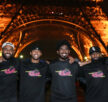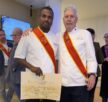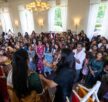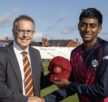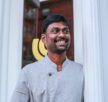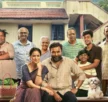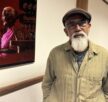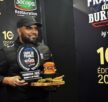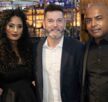

By the time we turn 30 – Ganan Kanagathurai
- 20th July 2010
- POST IN :SOCIETY,TELEVISION
By the time we turn 30, most of us will have just begun to find our feet in the world, finally beginning to cement ourselves in our ways, both in our careers and personally. So hearing about Ganan Kanagathurai, the 29-year-old who is already Executive Director of Finance and Strategic Planning at Disney ABC TV Studios and was featured in Variety Magazine’s ‘‘Top 40 Under 40’’ list, is highly impressive.
Originally from Middlesex, England, he read Economics at University College, London (UCL), and then went on to complete his BA in Corporate Law, over at UCLA. He spent some time working at a Big Four audit firm in London, before moving to L.A., where he currently resides. Kavya from the Thamarai team caught up with him, to find out more about his incredible achievements.
K: First things first, you got listed in Variety’s “Top 40 Under 40” list last month. How did that make you feel?
G: It was a great honour to be chosen by Variety in their ‘Top 40 under 40’. This recognizes the top 40 most influential people under 40 years old in the corporate entertainment business so being recognized with some of the top minds in the industry certainly is humbling.
K: Do you see yourself as one of the most successful people of your age? Tell us about the interview with Variety.
G: I definitely don’t consider myself successful when compared to my peer group. There are many people around the world doing big things at my age: running business, winning Olympic medals and making big changes in the global community, my accomplishments are negligible compared to these but I am still proud of them nonetheless.
Variety is a weekly media and entertainment trade magazine with a circulation of over 30,000 a day. They publish a number of lists over Christmas, one being the ‘Top 40 under 40’. They did some
research on my background, spoke to the CFO of the Walt Disney Company and the CEO of ABC TV Studios and interviewed me at my offices in Los Angeles. It was a pretty relaxed interview probing my journey so far, my future plans and my personal and career motivations.
K: Tell us about your background and cultural heritage and how your family feels about your obvious achievements.
G: I am of Sri Lankan Tamil heritage. My dad was born in Sri Lanka and my Mum in Malaysia, however I was born and raised in London. My family and my culture are very important to me and I have always tried to stay connected to both as much as possible. My family is very proud of my achievements (I think). They are finally seeing some payback on all the hard work they put in to raise and educate me (smiles).
K: You must be living the high-life in L.A! How does it compare to London and what made you study at UCLA, as opposed to London?
G: Working in the TV Biz in Hollywood you may think I live the high-life but the reality is far from glamorous – working an 80-hour week takes all the glamour out of my job. I am fortunate to get a lot of perks in my job so I suppose I can’t complain.
London and LA are worlds apart and very hard to compare. One is a financial capital of the world with a fast paced hectic life schedule and the other is the capital of the entertainment industry with a relaxed and relatively peaceful pace of life. As I get older I find the LA lifestyle more flexible and comfortable but I do often miss friends, family and the hustle of London.
K: What University were you at in London, and how was university life for you?
G: I did my first undergraduate degree at the University College London in Economics & Statistics and then once I moved to LA I completed a second degree in Business & Corporate Law at UCLA to help me gain a broad overview of the US legal system and deal with talent contract negotiations that I am involved in at work.
University life was great, perhaps some of the best years of my life. I was a typical university student, not attending as many lectures as I should have but attending enough to get me a decent degree. I made some great friends at University that I am still in touch with today and enjoyed every minute of ‘Uni’ life.
K: Your degrees were in Economics and Corporate Law, how did they tie in with your position within Finance and Strategic Planning? What does your job actually entail?
G: My first degree was in Economics at UCL and my second degree was in Business and Corporate Law at UCLA. I have to deal with a lot of talent (actors/writer/directors) contract negotiations and studio acquisitions and therefore a sound basic foundation in business law is fundamental to these operations.
I oversee the Finance and Strategic Planning groups at the Walt Disney ABC TV Studios. We prepare the annual and 5 year strategic plans for the business. We also prepare ad-hoc financial analysis for our executive management board and provide analysis on contract negotiations and green-lighting activities.
No two days are ever the same for me. My business is very cyclical and therefore I deal with different deliverables throughout the year. My day is full of meetings with people from across the whole of the Disney Corporation as well as agents, writers and actors.
K: Tell us what goes on during a typical day, for you.
G: I usually get into work at 7am, talk to London, read the paper and have breakfast. My morning consists of department updates and meetings with ABC Senior Executives or other Disney Media colleagues until lunchtime. If I am lucky I get a decent lunch break and then back into similar meetings until around 5 or 6pm. Then I spend the next few hours catching up on emails and reviewing work. This is a typical day but sometimes I get to sit in on pilot screenings, casting sessions and live tapings. These are an enjoyable release from a stressful workday.
K: You’ve obviously achieved a lot so far in life. What, for you, is the achievement that you’re most proud of?
G: Professionally, being named in Variety’s Top 40 under 40 is certainly up there but I am most proud of my nomination to the American Motion Pictures and TV Producers (AMPTP) New Media Strategy Panel. This group of leading New Media minds helps to shape, develop and advise all the large Film and TV Producers on their New Media strategy’s and monetizing new media revenue streams.
K: Being the Executive Director of a department, you must have a lot of people working under you. What are the biggest positives and negatives of being a leader of a team?
G: Biggest positives are being able to nurture and develop people’s careers. Through my own experiences and interactions with my team I am able to enhance their learning curves and see them develop into more experienced and productive professionals.
Biggest negative without a doubt is the politics of leading a large group. Different people have different agendas, visions and motivating factors that are often incongruent with each other and with my own. Having to manage these is a skill I have yet to master and something that causes a lot of problems within our team and a lot of stressful sleepless nights for me.
K: How did the recent economic downturn impact on your job? Did you have to deal with many changes?
G: Like most organizations the economic downturn affected us severely. Pretty much all our revenues were down and our financial projections were bleak. Early in 2009 we had to let go of 3 people, which is approximately 8% of our team. Having to deliver this tough message was the hardest challenge that I have faced professionally and one that I hope I will never have to do again. The challenge of losing these team members whilst still having to deliver the same quality work product put an immense strain on my department and myself.
K: You also lecture at the New York Film Academy in California. What topics do you cover, and how does it feel being on the other side of the lecture theatre at university?
G: I guest lecture a course called ‘Hollywood Economics’ that aims to give producing and directing students an insight into how the economics of Hollywood really works. From the basic film financing arrangements to complex talent agreements and production accounting concepts. This course gives them a holistic overview of the entertainment industry and the economics that makes it tick.
I prefer being the teacher far more than being the student. I enjoy sharing my knowledge, experience and expertise with others and assisting them to seek their full potential. This position allows me to do exactly that.
K: In your spare time (if you manage to find any), does TV feature a lot and with ABC having such a variety of shows, do you have them on your viewing schedule? What’s on your iPod and how does G: your leisure time pan out?
I spend very little time at home and therefore watch very little television. I don’t watch any of my own shows but have been known to watch some of the competition. My iPod is pretty diverse. I have a lot of reggae, jazz and a bunch of self-motivation and business eBooks that I rarely listen to.
K: Do you ever get a chance to mingle with say the cast of Lost/Grey’s anatomy/Flash forward/Ugly Betty (did you predict the numbers that got it cancelled?), or any of ABC’s top shows?
G: I know the cast of most of our shows pretty well, most of them in a professional capacity but I do have a few that I would class as friends. All financials for all ABC produced shows go through my department. The financial modelling that I present to our Executive Management is integral to their decisions. I can’t really comment on the Ugly Betty decision but I did have a small part to play in it.
K: In fact, LA is filled with Hollywood stars – do you meet many and do you get to go to many of the industry events?
G: I am not really much of a celebrity fanatic but living and working in Hollywood I do run into a lot famous people. I am fortunate enough to get access to some industry events and some of the big award shows including the Emmys and the Globes. You would be surprised how boring and uneventful they are.
K: As an Asian in America, how does your culture set you apart and do you ever have questions of curiosity thrown at you about your ‘Desi’ side? Do you meet Tamils in LA and do you get to eat any good Tamil cuisine?
G: Los Angeles is such a multicultural city that my ethnicity doesn’t really set me apart at all. There are very few Asian people in our industry so in that sense I suppose I am different but I don’t think my culture/ethnicity neither helps nor hinders me.
Not too many people were interested in my ‘Desi’ side until recently when they found out I was from Sri Lanka. Due to the increased international media coverage on the end of the war and the recent elections more of my colleagues and friends have shown an interest and are keen to learn more about the political and military struggles of the region.
I do get some good home cooked food from a few Sri Lankan friends out here but not as much as I would like.
K: What are the girls in LA like, as opposed to London and do you come back to visit London much? Is travelling a big part of your job and if so, do share your favourite cities.
G: I come back to London once or twice a year. Disney’s European hub is in London so I travel back on business frequently. Travel is a key part of my job. I have an office and a small team in New York and I am there once every 2 months. I visit many of our international locations and travel to speak at a few global new media conferences. I have been lucky enough to travel on business and pleasure to more than 40 countries.
Girls are the same all over the world; lets leave it at that before I get into trouble (smiles).
K: I hear you played a lot of sports while living in London – do you continue to enjoy those in LA?
G: You are correct. I used to play a lot of sport growing up in London, mostly cricket and football. Due to my work schedule and my constant travel I don’t play as much as I would like to now. I don’t play any cricket out here but still play a little football on the weekends. I have begun to play a lot of baseball and flag football (American Football) recently and am hooked on all American sports. I end up watching more sport than playing it but I am committed to change that this year.
K: Any words of inspiration, for those who may wish to follow in your footsteps and some key points on ‘getting to the top’?
G: One must always have a measurable goal for every action under taken; this is true for an overarching life goal, a career path or a small simple business plan. This does not have to be very detailed or descriptive; it just needs to be present. This goal is imperative to the success of the respective action, because without knowing what you want to achieve, how are you going to achieve it? Set this goal and work backwards from it, working out every sub-action that needs to occur for the final action to be successful.
In my personal opinion, the only way to beat your competition and ‘get to the top’ in any facet of life is by following these three simple things: dedication, obtaining superior information and an immense self-belief. Let me explain:
• Dedication – There will be many times when you will get knocked down, experience failure or be told you cannot do something but it is the dedication to your goal and your passion to succeed that will set you apart from your peers and help you strive to reach that end goal.
• Superior Information – know as much as you can about as many things as possible. There is no such thing as knowing too much. Read, research, question and educate yourself – ‘Knowledge is power’
• Immense Self-Belief – ‘If you don’t believe in yourself no one else will.’ You must be confident in your own abilities and have the courage of your convictions.
These may seem very simple and obvious, but in reality, are very difficult to master. If you can concentrate on these three fundamental concepts I believe anyone can be successful.
Interview by Kavya Rajagopalan for Thamarai.com (c)
- Previous Post
The Tamil anthem – Semmozhiyaana Tamizh Mozhiyaam
